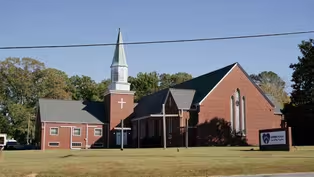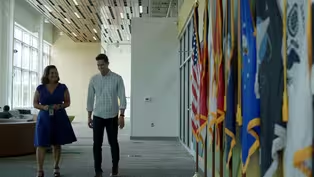
Durham's Bold Plan to Make Housing Affordable Again
Clip: 3/14/2025 | 8m 44sVideo has Closed Captions
See how Durham, NC uses creative solutions to keep housing affordable in a booming market.
In five years, average rents in Durham have shot up over 50%, pricing out longtime residents and making homeownership a distant dream for many. Through innovative zoning changes, creative public-private partnerships, and a unique community land trust model, this NC city is taking a bold approach to tackle the housing crisis. See how Durham is working to keep housing affordable for everyone.
Problems playing video? | Closed Captioning Feedback
Problems playing video? | Closed Captioning Feedback
ncIMPACT is a local public television program presented by PBS NC

Durham's Bold Plan to Make Housing Affordable Again
Clip: 3/14/2025 | 8m 44sVideo has Closed Captions
In five years, average rents in Durham have shot up over 50%, pricing out longtime residents and making homeownership a distant dream for many. Through innovative zoning changes, creative public-private partnerships, and a unique community land trust model, this NC city is taking a bold approach to tackle the housing crisis. See how Durham is working to keep housing affordable for everyone.
Problems playing video? | Closed Captioning Feedback
How to Watch ncIMPACT
ncIMPACT is available to stream on pbs.org and the free PBS App, available on iPhone, Apple TV, Android TV, Android smartphones, Amazon Fire TV, Amazon Fire Tablet, Roku, Samsung Smart TV, and Vizio.
Providing Support for PBS.org
Learn Moreabout PBS online sponsorship- There's no silver bullet to solve the housing crisis.
A developer will say, "Let's ease land use restrictions to build more homes."
A politician will argue, "Let's lower interest rates, so people can afford their mortgage."
A city planner will say, "Let's revitalize blighted neighborhoods to build up housing stock."
But a local resident will argue that will price us out of the only affordable neighborhood left in the city.
You see, it's like one big giant game of whack-a-mole, a solution for one creates problems for others.
This is happening all across America, but especially in the south.
Newcomers are leaving pricier cities and flooding southern markets, pouncing unavailable homes.
The result: prices are shooting through the roof.
This housing puzzle is way more complex than just a game of supply and demand.
And the solutions?
They're complex too, and sometimes controversial.
So I'm not here looking for a silver bullet, but I do want to hear from the perspectives of the local government, private sector, and community leaders, is there a solution that meets everyone's needs or should we just let the market sort it out?
I'm David Hurst.
This is ncIMPACT.
[pensive music] North Carolina is the third fastest growing state in the country.
For cities like Durham, this surge of new residents is driving housing costs to unprecedented levels.
It's pricing out residents like Sabrina, a young professional who wanted to become a homeowner but couldn't find anything in her price range.
When you were searching, what was going through your mind?
Was that a frustrating process?
- It was starting to get frustrating, 'cause I was like, this is a mistake.
Like I don't have enough money for this, or I'm not gonna be able to find a house that I'm looking for.
- [David] But this isn't just about young professionals struggling to find homes.
In five years, average rents have increased by more than 50% in Durham.
While exploring how rising rents impact longtime residents, I spoke with Bertha Bradley who's witnessed firsthand how Durham's housing market has transformed her community.
- You've got these apartments now, studio is $1,500.
What is these mothers gonna do?
You got mothers that don't have anywhere.
Children is living in the shelter because the mamas can't afford to get a nice apartment.
It's just not right.
- [David] The current crisis is pushing households to their financial limits.
The low income housing has been in crisis mode for years.
In the 1980s, the federal government slashed housing in urban development resulting in a 74% reduction in the number of households receiving assistance.
As federal support dried up, states tried to fill the gap, but researchers say, unlike the federal government, almost never for the general low income population.
The burden then fell to cities.
But what can local governments do when housing costs are out of control?
While in 2018, Durham residents approved a $95 million affordable housing bond.
It's one of the largest ever in the state.
The idea is simple: the city borrows money, then passes it to developers as gap funding to make homes more affordable.
The city then pays investors back over time, usually with tax dollars.
To understand the impact of Durham's housing bond, I met with Dan Levine from the Self-Help Credit Union.
He helps turn these public investments into actual homes through Durham residents.
- And so I think it's really kind of putting your money where your mouth is, if you will, of like voting for the issues that you say you care about and actually trying to work to solve them.
- [David] More than half of the bond went toward Forever Home Durham, a five-year plan to create and preserve affordable housing across the city.
Take the Willard Street Apartments where rents range from $600 to $800, about a third of market rate.
The city made this possible by selling surplus land near the transit station to developers for just $10.
But they had one condition, keep it affordable.
However, this is just one project in a city of nearly 300,000 people.
- It takes a long time to get through the process to re-zone land and to come up with financing and to actually do the construction to build homes.
And so it's not the type of thing that, you know, a problem that took 20, 30, 50 years to create is not gonna be solved in months.
It's gonna be probably decades.
- [David] The bond money helps, but it can't solve everything.
And that's led Durham to try something else.
Something that's stirring up controversy in cities across America.
Cities like Durham are realizing that sometimes the biggest barriers to affordable housing aren't financial.
They're legal.
So in 2019, Durham started rewriting its rule book.
The city loosened restrictions on what kinds of homes could be built where, and gave the green light to more missing middle options like duplexes and so-called "granny flats."
And they didn't stop there.
In 2023, they doubled down, tweaking zoning again to incentivize affordable housing.
- Community groups said, "Why don't we use this city on land to build affordable housing?"
- [David Voiceover] To understand how these zoning changes are reshaping Durham's neighborhoods, I met with Reginald Johnson.
He's the city's community development director.
- So how much has the council loosening restrictions on where you can build, how much has that helped with the housing shortage?
- That has helped.
I would say one of the things that they've done is allowed for more density and created a density bonus, whereas developers who want to have more density can agree to have affordable housing units put into their developments.
And people are comfortable with diversity in their neighborhoods in terms of economic diversity.
And that's really what excites me.
So it gives us a lot to work with, but we're not able to solve the problem.
But we are able to make a good dent in it.
- So while these zoning changes are bringing new housing to market, often revitalizing divested neighborhoods, they're also raising a critical question: How do we add housing without displacing the people who need it the most?
Here we are playing whack-a-mole again.
But there's a third approach that's trying to bridge this gap.
One that's been working quietly in Durham for nearly four decades.
It's called the Community Land Trust.
Here's how it works.
The trust owns the land while residents own or rent the homes on it.
This unique arrangement keeps housing costs lower because homeowners aren't paying for the land.
- So this home has a great kitchen layout.
This is where the table's gonna be.
We haven't put in the cabinetry yet, but it'll be along this wall.
- [David Voiceover] I met with Sherry Taylor, Durham Community Land Trust's executive director.
She showed us around one of the homes that's being renovated and about to hit the market.
- So what we do is we offer an ability for people to stay and not be displaced, stay in the places that they love.
They can afford to live here, either by renting or by owning, and then they can be a part of this great community that we have.
It's always been a great community and now people can continue to be part of that without being pushed out.
- But the trust faces its own challenges, particularly when it comes to acquiring new properties.
And when it comes to desirable land, like I imagine this one right here, how do you battle for-profit corporations or developers that also may want to invest here?
- Battle is a great word, 'cause that's exactly what it is.
On a everyday basis when we wanna acquire property, we are competing against everyone in the world, it seems like, in-state investors, out-of-state investors, Wall Street folks who wanna invest in single family homes and real estate in this area, they know it's highly marketable.
And so the battle comes down to the numbers.
Can we offer what the private market is offering?
So that's the battle.
- [David Voiceover] One of the residents they're fighting for is Bertha Bradley.
- A lot of the families that do have the housing from Durham Community Land Trust, we wouldn't be here.
I'm one of them people.
If it wasn't for Durham Community Land Trust, I would not be able to be in my city.
And I'm born and raised here.
- [David] And it also empowers new homeowners like Sabrina, who found a path to home ownership through the Community Land trust.
- I would say I'm extremely thankful.
I don't really think I'd be able to own a house, you know, at 26 without like this existing.
- [David] From young professionals like Sabrina to longtime residents like Bertha, Durham's affordable housing crisis affects everyone differently.
And maybe that's why no single solution will work for everyone.
What is clear is that a mix of these different solutions will be necessary, so that a solution for one group of people doesn't push out others.
- The the irony of a crisis is everybody kind of gets on the same page and works together.
It's almost like if you have a natural disaster and you have neighbors who weren't speaking to each other before and they come together and roll up their sleeves and work side by side.
- [David] For ncIMPACT, I'm David Hurst.
Charlotte's Innovative Plan to House Every Homeless Veteran
Video has Closed Captions
Clip: 3/14/2025 | 8m 6s | Learn how Charlotte, NC uses data and partnerships to get every homeless veteran into housing. (8m 6s)
An Empty Church Finds New Life as a Homeless Shelter
Video has Closed Captions
Clip: 3/14/2025 | 6m 32s | An Asheboro church facing closure finds new life as a shelter for homeless women and children. (6m 32s)
Video has Closed Captions
Preview: 3/14/2025 | 20s | As housing crises deepen statewide, communities create new paths to affordable housing. (20s)
Providing Support for PBS.org
Learn Moreabout PBS online sponsorship
- News and Public Affairs

Top journalists deliver compelling original analysis of the hour's headlines.

- News and Public Affairs

FRONTLINE is investigative journalism that questions, explains and changes our world.












Support for PBS provided by:
ncIMPACT is a local public television program presented by PBS NC


